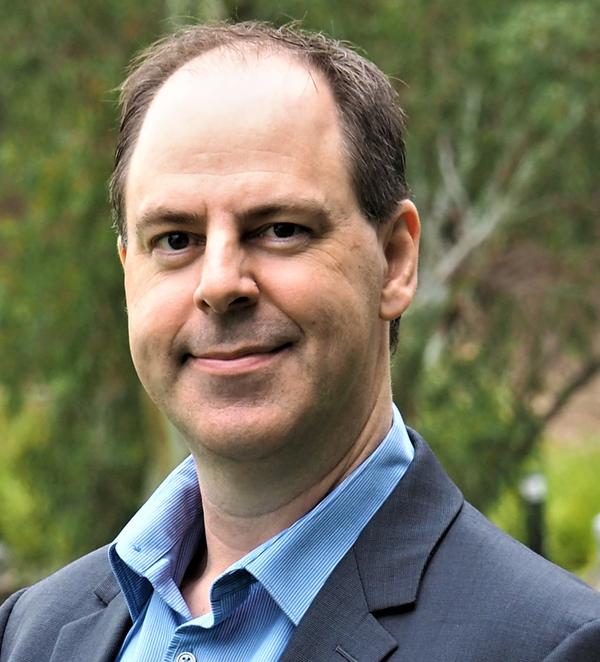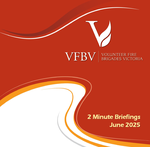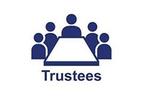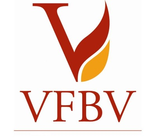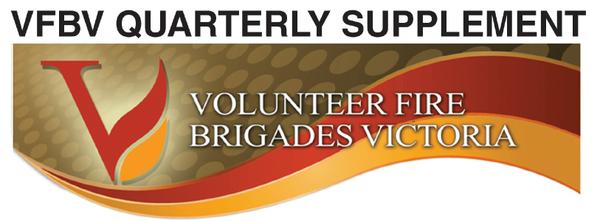Progress continues on shaping and influencing the Allan Government’s controversial new Emergency Services Tax. The decision to reduce the primary producer rate to the same level it was under the old Fire Services Property Levy will bring significant relief to thousands of farmers, acknowledging the anguish does not dissipate completely with only a one-year reprieve announced.
This has taken prolonged advocacy, and there is still much to do.
VFBV’s actions to commence our public education campaign in December last year has proven effective at uplifting peoples understanding of
the changes that were being sought and calling out the untruths being propagated in our name. All our actions have been designed to ensure farmers and primary producers were the focal point of our advocacy. We recognised early on the devastating impacts this tax would have on our rural communities, and designed a campaign that would give farmers, rural communities and their representative bodies time to agitate.
Ensuring the backlash was truly
seen as grass roots community action was key to ensuring our actions did not suck the oxygen out of those voices who needed to be heard to explain the devasting impact this tax was going to have on those who can least afford it. Real people with real stories is what moves the needle.
And while significant progress has been achieved, there is still much to do.
To backtrack for a moment and update
where I left off in last month’s newsletter, the Victorian Government rammed its controversial Emergency Services Tax through both houses of Parliament during an all-night sitting finishing at 01:27am Friday 16th May. It is very telling this legislation was
required to be pushed through the dead of night.
As we had warned members in the months leading up to the vote, the Government was only able to pass its Bill with the support of six votes from the cross bench. Following secret negotiations the night before, the Greens (4), Legalise Cannabis (2), and the Animal Justice (1) parties threw their support behind the government’s new tax to give the government the votes they needed to introduce one of the most egregious, unjust and unfair taxes that Victorians
have ever witnessed. I don’t use the word egregious very often, but egregious it is.
You see, the Emergency Services Tax isn’t a tax on income, nor is it a tax on the rich. It is a tax on everyday Victorians, with very little of it directed to boost the actual front line emergency services it claims to support. And while they claim it only affects landholders, there will not be a renter in the state that gets shielded from their landlord passing
it on, nor any other Victorian who will pay for it each time they visit their local supermarket, shop or small business.
This isn’t what the 2009 Bushfires Royal Commission recommended. What they recommended was the Fire Services Property Levy that was introduced to Victoria in 2013. The Government’s own independent Bushfires Royal Commission Implementation Monitor, Mr Neil Comrie AO, APM confirmed to Parliament in his July 2014 Final Report that recommendation 64 was complete.
This new tax
is simply a grubby cash grab to fund government services you already pay for and cleverly hidden in plain sight behind your proud and hardworking fire and emergency service personnel. And it disproportionately impacts on farmers and primary producers who use their land to generate their income. Farmers had already suffered a 59% increase to their rates last year with none of this flowing to CFA. This is the same land that is used to generate and grow our food. And while the Animal Justice party
has never shown much empathy or compassion for livestock farmers, this tax equally hits vegetable, soybean and grain growers alike and the Greens, Cannabis and Animal Justice parties have allowed it to occur.
Make no mistake - this is bad government policy. Its effects will directly translate to city areas, your supermarkets and the cost of your food, hitting the most vulnerable within our communities. Even the GST when it was introduced carved
out fresh food, a concept the Allan Government seems to have forgotten.
And while they claim to have done it for emergency services, not a single emergency service representative body supported or endorsed their changes. For almost six months now, we have educated the community about the impacts and illustrated how just 7 measly cents for every new dollar collected will actually flow to volunteer agencies.
The Greens have proven themselves to be amongst the most gullible political parties in Victoria – proudly announcing the so called “concessions” they negotiated to secure their four votes. They proudly claimed credit for reducing the primary producer rate from a 189% increase to 150%. You can’t make this stuff up. I certainly hope they are not sitting by their phones waiting for farmers to thank them.
It took a government
backflip 15 days later that ripped up the Greens so called concession and reset the primary producer rate to the same rate used under the Fire Services Property Levy granting a one-year reprieve for farmers.
And while I think there is strength in political leaders admitting when they are wrong and reversing bad policy – they have not done this. All they have done is announce a one-year reprieve for primary producers. Rates for residents,
commercial and industrial will all go up as planned. And while I welcome the announcement of a reduced rate for primary producers, doing right should never have to wait for a curtain call.
The Greens claim they secured minimum funding for FRV, CFA and SES by changing the words “up to” to “no less” – displaying a gross lack of understanding in how government budgeting processes work. Newsflash – the Minister is required each year to set the
budgets of the agencies BEFORE she sets the rates of the levy. She continues to have full discretion on what level the agency budgets are set.
Simply changing two little words in the rates bill now simply removes discretion to limit the impact on taxpayers and mandates that the government must now pass on 95% of the cost of the budget she has previously set through the new tax. A mechanism Victorians will rue the next time there is a major
disaster like Black Saturday or the Black Summer bushfires that requires significant government investment. It does not guarantee minimum funding for the agencies in any shape or form, and shame on anyone who pretends it does. I suspect the Treasurer had to supress her glee when the Greens floated this as a supposed concession.
As for the claim they negotiated a guarantee that every dollar collected by the new emergency services tax could only go
to front line emergency services and not bureaucrats – their gullibility was again on show.
The only way to guarantee that funding could only go to front line emergency services was to remove the seven government entities that were already funded from consolidated revenue leaving just CFA, FRV and SES. The opposition put up this exact amendment and demonstrating utter hypocrisy - the Greens, Cannabis and Animal Justice parties all refused to
support it, choosing instead to play politics with our emergency services.
Evidence of the government’s deceit did not take long to prove.
In the 2025/26 Victorian Budget tabled last week, Budget Paper 5 revealed the new emergency services tax will collect an extra $590M in the first year. Given this number is suspiciously close to the $600M surplus the government has announced, our fear the government would simply pocket the savings from consolidated revenue to redirect to other budget blackholes - appears well founded.
Looking through the budget papers for an extra $590M in spending on front line emergency services
remains equally allusive. Volunteers call on the Greens, Cannabis and Animal Justice parties to show volunteers where the extra $590M they guaranteed for frontline services for the CFA, FRV or SES budgets is.
Budget Paper 3 (goods and services) outlines the only additional
allocation to CFA for the 2025/26 year was half a million dollars for “Building more Country Fire Authority stations”.
Budget Paper 4 (capital programs) outlines $13.4M to be sent over to the CSBA to supposedly build more CFA stations (regional). I say supposedly - because the
CSBA continues to be a black hole where the funds going in seem to have no relation to the actual builds coming out. A second entry is listed as “Further supporting our emergency services and volunteers (statewide)” which is allocated just $13.1M with no further description or explanation.
Most concerningly, there is not a single new CFA fleet initiative announced in this budget. You have to rely on the $50M allocated for 2025/26 to be split between CFA and SES that was announced in the 2024/25 Budget update to find any new spend on trucks for the
upcoming financial year. So much for supporting “our hardworking volunteers”.
Members are reminded not to fall for multi-year announcements where they try to bundle multiple years together so they can quote a big number. They do this to confuse and obfuscate. Always come back to a
single year investment figure and their arguments quickly flounder.
In summary, these amounts are a million miles, sorry – 500 million miles away from the extra $590M in additional revenue expected to be raised by the new emergency services tax. It proves what we said all along - that this new tax has nothing to do with pumping additional money into Victoria’s emergency services. In fact, if we look at the whole output summary for Emergency
Management Capability for the Department of Justice in the performance statement, the budget actually shows they are expecting to spend $203.1M less than they did in 2024/25.
And here in lies the rub. People keep asking me why CFA volunteers are so angered by the changes legislated under the new Emergency Services Tax. It’s simple really.
For one, they chose to add the volunteer name to their new tax. A huge mistake.
You will notice I have refused to use its real name which is
“The Emergency Services and Volunteers Fund.” Labor, Greens, Cannabis and Animal Justice all refused to support the amendment VFBV proposed, and put up by Jeff Bourman of the Shooters, Fishers and Farmers party. This amendment would have cost the budget zero, and their refusal to back it is just spiteful and has deservedly triggered anger.
Until the words “volunteer fund” is removed from the levy, I will continue to refer to it as the new
Emergency Services Tax, and will be encouraging all Victorians to do the same.
The premier also continues to swipe away criticism by claiming CFA and SES volunteers will not pay the new tax at all. She forgets to tell people there is a cap on the farm rebate, and it only applies to one property or farm and some CFA farmers will continue to pay for the very services they provide.
Volunteers also
recognise the biggest ruse of all. Having suffered five consecutive cuts in the form of government grants to CFA – they are sick of being taken for granted and having people pretend this new tax is boosting CFA’s budget when it isn’t. And hence our
community education campaign.
But the most important reason is volunteers are not doing this for themselves or for a handout. They are part of the very communities they protect. And while the Government appears to have just woken up and realised this week that there is a drought, our members work, live and protect these communities 365 days a year and know how hard many are doing it during drought and a cost of living
crisis.
And while the one-year reprieve announced by the Government is positive progress, it represents just that - a one-year reprieve.
VFBV welcomes the Liberal/ National commitment to repealing the Allan Governments Emergency Services Tax. The only commitment that buries this policy for good.
The only way to guarantee this new tax gets buried is
to continue our advocacy for both sides of politics to commit to its repeal. And this is where immediate efforts need to focus.
We are asking that local council’s detail on rate notices exactly which and how much each emergency service receives from the new tax so the public can see very clearly where the money is going – or more accurately – where it is not.
The Government’s Gazette of May 30 confirms what we said all along – CFA’s funding will account for only 20% of the tax raised, and SES accounts for 5%.
Regional communities will not soon forget, and many will not forgive - the pain and anguish
caused by this tax, and this government’s track record that prioritises spending on big builds in the city, while turning their backs on everyone else, including our CFA. However, it won’t be until rates notices go out over the next few months that most Victorians will wake up to the new sneaky tax for services they already pay for. And, ultimately, Victorians will not return to the ballot box until November 2026.
VFBV’s focus will continue to be
on practical next steps and outcomes that will make a tangible difference. 12 months ago, in the June 2024 newsletter, VFBV commenced its education campaign on CFA underfunding - and is a good reminder that this is a marathon and not a
sprint.
And while the one-year reprieve for primary producers is great, we will need to continue to advocate for a fairer tax that properly reflects risk and cost and provide certainty for these communities for the future. I want to especially thank each and every volunteer that has heeded our messages over the last few months to make contact with your local MP, display their 30 year old tankers, and raise CFA’s underfunding. For those that
haven’t, there is still value in doing so.
Governments only reverse positions when they are afraid of losing a seat or from pressure from their backbench. And backbench MPs only get nervous when they hear from their local constituents. Real stories from real people do make a difference. If local MPs are not hearing from constituents, then they will think people are happy or have moved on. Remember you are trying to change their minds, so engage
with the facts. Remember, every single
upper house Region in the State has at least two labor MPs. Some of you will also have a Green, Cannabis or Animal Justice party member. We have produced an easy guide detailing every party that
voted for the Bill and how to get in contact with your local member.
We have also produced an easy to understand guide for volunteers to help them understand how the volunteer rebate is likely to work. We can’t call it a fact sheet just yet – but we want people to be aware of what has been announced so far so you can do your own calculations. We are also working hard with CFA on internal arrangements to try and make the process as easy as possible.
Thank-you to each of the 600 volunteers who back in March provided detailed feedback. Your feedback was critical to our opposition of the new tax, and our desire to seek changes. It allowed us to progress the argument on behalf of Captains about how divisive only rebating some volunteers and not others would be. As previously reported in late April,
the Government has now agreed to a broad criteria that does not discriminate between operational and non-operational roles. We must not lose sight of these improvements along the way. They have taken much work and effort.
We will remain steadfast in our commitment to pursue meaningful
change while also respecting that each person is entitled to their own views. We trust implicitly that brigades and brigade Captains are best placed to make decisions on what actions may or may not impact upon their communities and respect it is not a one size fits all approach. We are prioritising community education actions, and things that are directed at those ultimately responsible for supporting the legislation in the first place. We must continue to ensure this doesn’t just become a fire
brigade issue, but a broader community one.
Most importantly, we want members to retain hope. The work you do in your communities is vital. And while it does not appear to be fully valued by all for now – history shows this is an anomaly and we can continue to work to change this. Our hope
is we can influence real change that rebuilds morale and critically supports our brigades to do what they do best - protecting lives and property. Never lose sight of the respect the community holds for what you do, nor our will to protect your reputation and helping the community understand what we are working towards. While we are all walking this path together, our strength comes from our connections to our local communities and the high esteem they hold for us. That esteem has been hard
fought and remains top of mind in all we do. Real strength comes from principled arguments that do not betray our values. Stay strong and stay safe.

